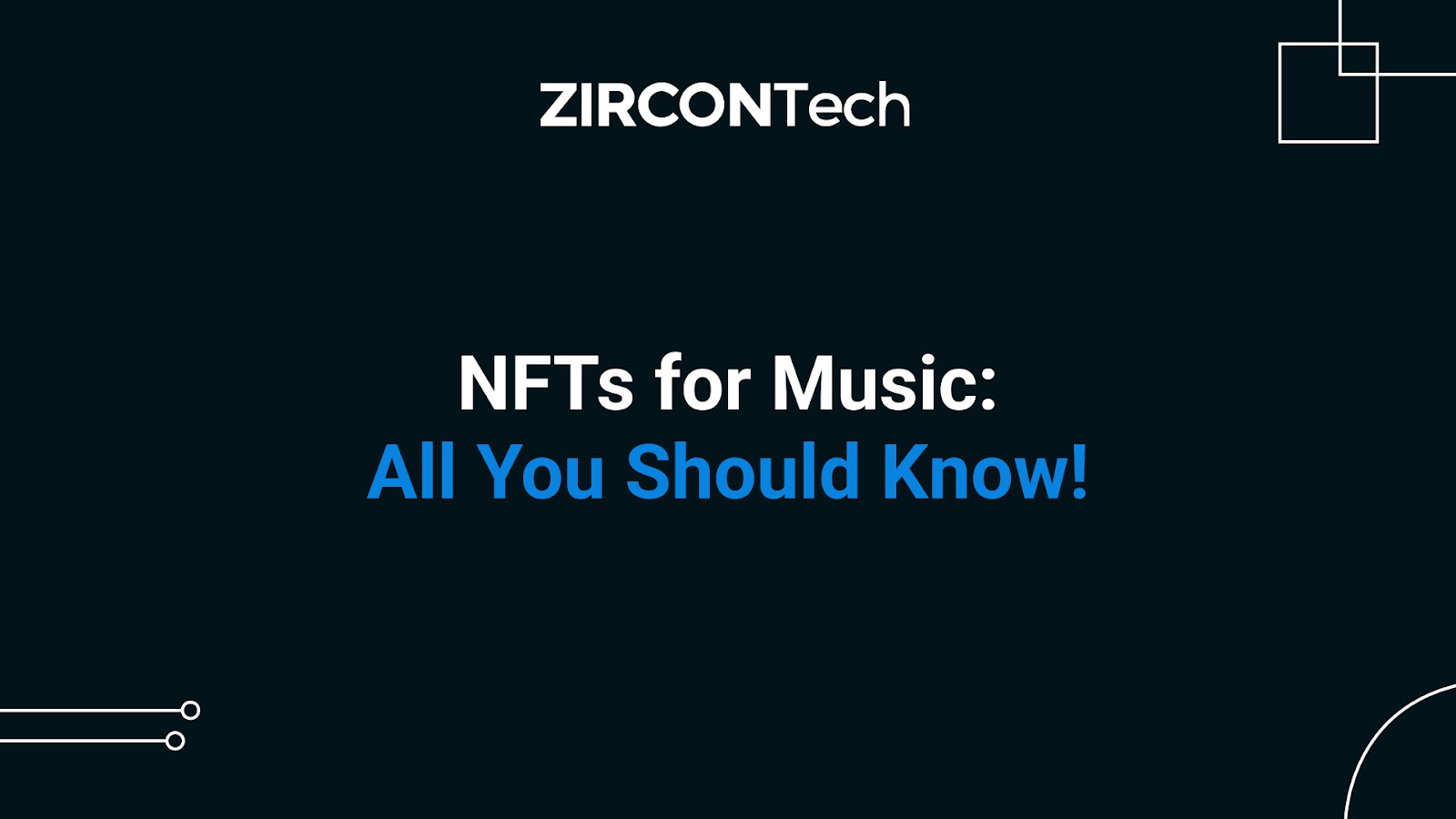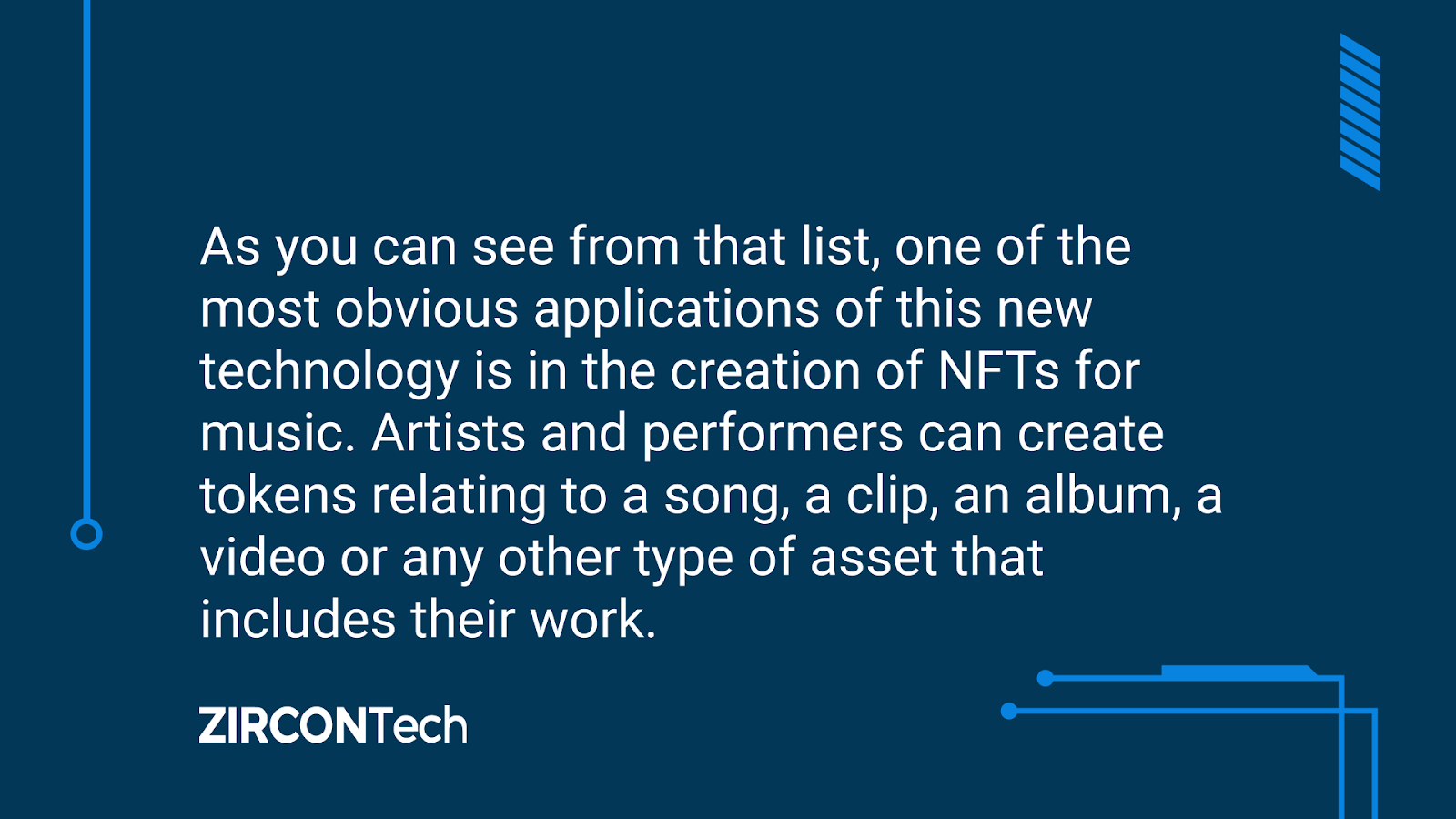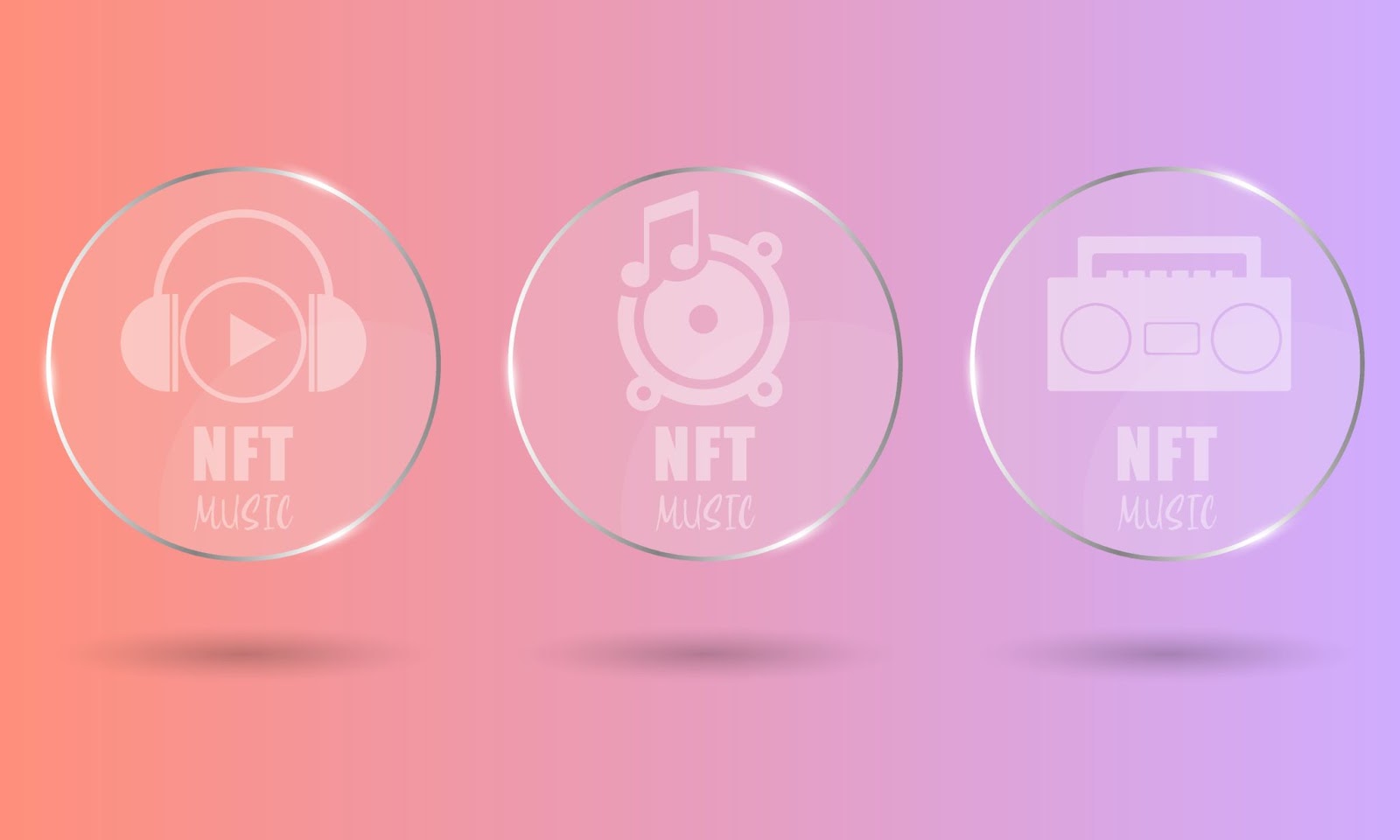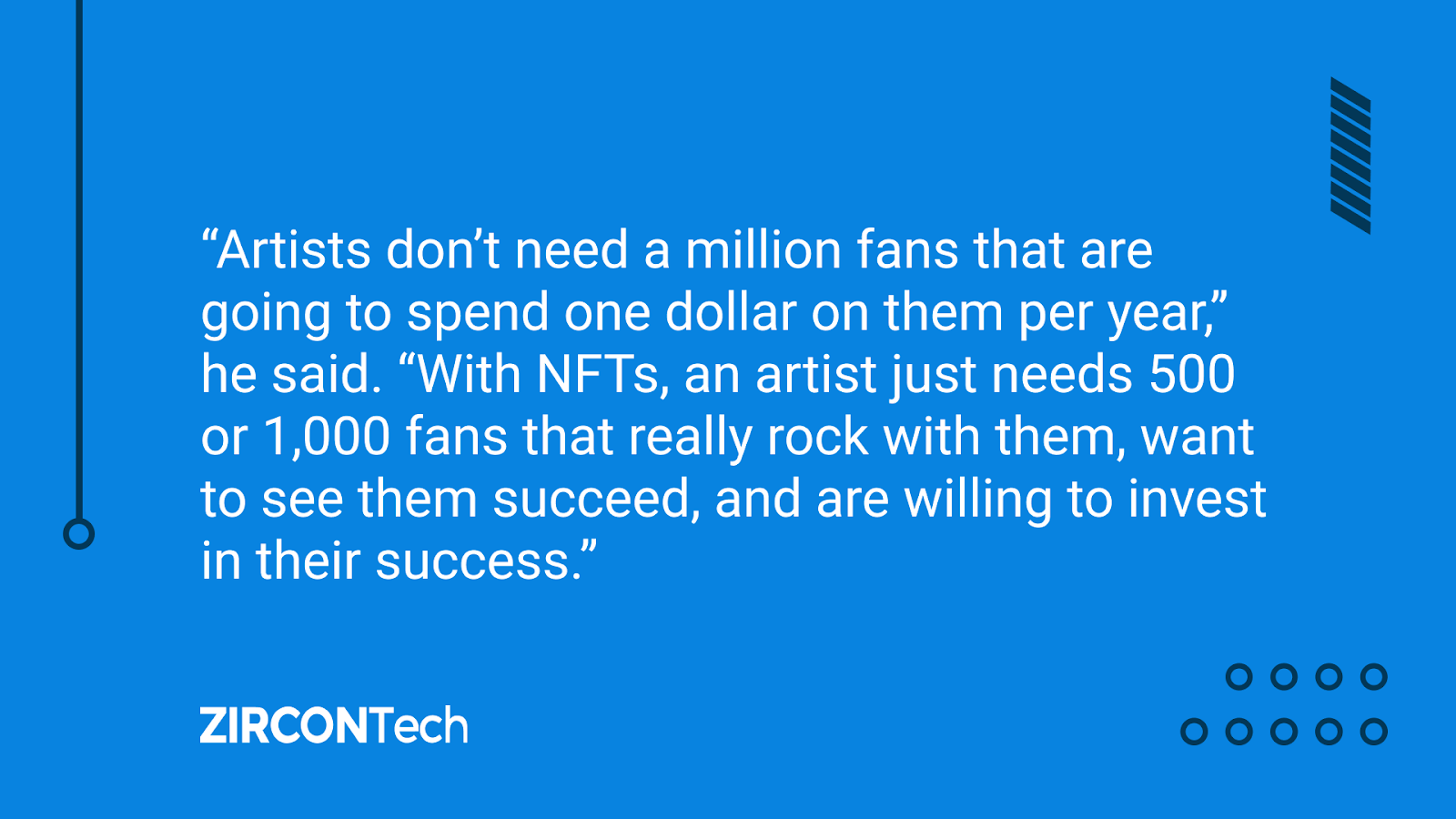NFTs for Music: All You Should Know!

NFTs for Music: Everything You Need to Know
Non-Fungible Tokens (NFTs) have taken the digital world by storm in recent years. Many people have invested in NFTs – and many more have shown an interest in them.
One area of artistic endeavor that has been particularly welcoming to the context of NFTs is music. In many ways, creating NFTs for music is one of the most compelling uses of this particular piece of digital innovation.
But what is the exact relationship between NFTs and music? How do NFTs in the music industry benefit performers and their fans? And how do we think the concept of NFTs for music will evolve and grow in the near future?
At ZirconTech, our status as a pioneer in blockchain development ensures that we have an in-depth understanding of the nature and potential of NFTs. Let us take you on a journey as we answer the question: What are NFTs in the music industry?
What Are NFTs in the Music Industry?
Let’s start with a quick reminder of what NFTs are. A non-fungible token is a digital asset whose main feature is its uniqueness – its non-fungibility. It cannot be replicated or altered. NFTs exist as tokens on a blockchain, usually Ethereum. They represent an item such as a video, an image, a piece of artwork – or an audio clip.

It’s important to remember, when considering the nature and impact of NFTs on the music industry, that this is an area of human creativity and entertainment that has seen an extraordinary degree of change in recent years.
The growth of streaming services such as Spotify, alongside video platforms like YouTube, has led to rapid change in the way people across the world access music by their favorite artists.
NFTs for music represent yet another significant step forward in this context.
What are music NFTs?
When an artist of any kind – including a musician – creates an NFT relating to their work, they can set a particular price on it. If you are a fan or music aficionado and you pay that price, you become the owner of that token for as long as you like. You can listen to it whenever you want, and sell it at a later date if you wish.
One positive side-effect of this trend is that it offers artists, singers and bands the opportunity to make money directly. The history of the music industry is littered with notorious examples of musicians who have been exploited by ruthless managers and agents. All too often, the people actually responsible for great music have been left virtually empty-handed, while those who controlled their careers filled their pockets.
The advent of free, or relatively cheap, streaming services has hardly helped in this respect. The income from repeated plays of your music on a streaming platform is much smaller than you would see from selling albums or CDs of your work.
However, NFTs in the music industry re-establish the commercial link between creator and fan. An artist who creates a musical NFT can make money from it by selling their work directly to fans.
As a result, those fans effectively become shareholders in the work of the singers and bands they most enjoy. The money they invest in NFTs in the music industry goes to the artists in question – who may in turn use those funds to finance their future work, or particular projects that their fans will enjoy.
Benefits of NFTs for Music Creators
There are several ways in which the growing relationship between NFTs and music offer potential benefits for the artists and performers who create our favorite musical sounds.
Perhaps the most significant is that the people responsible for that music maintain control over the creative and financial direction and decisions associated with their work.

NFTs in the music industry also offer the potential for artists to connect more closely with their fans, rather than having to use the go-between of a music label. This also means that artists keep a greater share of the proceeds of creating their music, rather than having to hand over a generous percentage to a label.
Benefits of NFTs for Music Lovers
As well as the potential benefits for artists as listed above, people who enjoy the work of a particular band or singer can also use the relationship between NFTs and music to enhance their enjoyment of their favorite music.
That relationship is a benefit in itself; ownership of a unique piece of digital artwork that contains your favorite singer’s voice, for example, can enhance the feeling of engagement with that singer and make you feel closer to them.
This sentiment can be enhanced by the fact that NFTs for music do not have to contain simply the music itself. Your music NFT may include the song alone; however, there may be associated materials to make your purchase feel even more special and unique.
You could have access to a personalized lyric sheet, or even a video message from the artist in question. Buying the NFT could also open the door to other benefits, such as front-row seats or a VIP experience at their next show.
This goes back to the nature of NFTs as a whole. Their uniqueness, their most important value, is a particularly strong commodity when it comes to enhancing the relationship you feel you have with your favorite singer or group.
The Development of Music NFT Communities
As popular music rose to prominence in the third quarter of the last century, one way to get closer to your favorite band was to join a fan club. Such organizations offered you the chance to feel even more involved in your chosen artists’ lives.
You might receive a regular newsletter, or the chance to buy branded merchandise or to enter a competition with special prizes – maybe even the chance to meet your heroes.
The sentiment driving the creation of old-style fan clubs is extremely similar to the rationale behind the development of music NFT communities. Simply by owning music NFTs offered by your favorite band, you gain a sense of belonging, of being part of a group that has something in common – your love for a particular performer.
But music NFT communities can be about more than emotion. Some exist to offer support to up-and-coming artists. Members of the MusicFund community, for instance, vote each month to offer financial help to three rising musicians.
As well as having a say in who the community supports, members can also attend its events. Those members can include music industry executives, artists, and fans all over the world.
Famous Examples of NFTs in the Music Industry
In the last couple of years, there have been some striking examples that have showcased the potentially powerful relationship between NFTs and music. They include particular album releases, and the development of projects aimed at creating further NFTs for music performers and fans.
The Kings of Leon
Perhaps the most famous example of NFTs in the music industry to date occurred in 2021, when the Kings of Leon released their new album, When You See Yourself, as an NFT.
Three different types of token were issued via the platform Yellowheart – a special album package, a live show package, and an audio-visual package. By investing in these NFTs, you could get the album, but you might also have the chance to secure front-row seats at one of the band’s concerts, or a VIP experience at a show.
The album quickly raised almost $2million in NFT sales.
Steve Aoki
Aoki is an American DJ and music producer who was quick to spot the potential of NFTs for music. If you buy one of his NFT passports, it grants you entry to AOK1VERSE, which launched in early 2022. This can give you access to free tickets and merchandise, as well as member-only events.
Aoki summed up the appeal of NFTs in the music industry when he said: “NFTs enable a two-way conversation between artist and fan. Previously, it was always one way; the artist produced something, and the fan either bought the product or not.”
Spottie Wifi
Mig Mora is a rapper who demonstrated vividly how powerful NFTs for music could be. He bought NFTs from the CryptoPunks collection, gave each an artist persona and put them up for sale.
The result was extraordinary. In the space of 60 seconds, he made $192,000.
Snoop Dogg
“A great opportunity to be big in music” was how the legendary rapper, who has long been an avid explorer of the Metaverse, described the possible future for NFTs in 2022.
Early that same year, he announced he was converting his label Death Row Records into an “NFT label”. He soon saw a token from one of his first NFT collections sell for more than $100,000.
Cocky
This is a slightly different type of NFT presence in the music industry. Cocky describes itself as an exclusive NFT lifestyle club that offers holders of tokens access to top-drawer music events.
Cocky devised experiences that money can’t buy – but that possession of the Cocky NFT can. There are 10,000 such NFTs, and ownership gives you the chance to attend a “once in a lifetime” event in an exclusive location – of which two are staged each year.
What Does the Future Hold for NFTs and Music?
Unless you believe that time will suddenly start running backwards, it is clear that the Metaverse and blockchain technology are here to stay. That being the case, it is inevitable that the role of NFTs in the music industry will develop and mature in the months and years ahead.
Although most NFTs for music so far have focused on modern styles such as electronic music and rap, there is every indication that the creators of all types of music, even old-school genres such as rock and classical, stand to benefit as the concept of NFTs for music becomes more widely accepted.
As we have seen, some famous artists have been quick to embrace the potential of NFTs for music. However, Mig Mora, the man behind the success of Spottie Wifi, zeroed in on the appeal of this new trend.

He is absolutely right. NFTs in the music industry can be particularly beneficial to artists whose credibility with a core audience outstrips their mainstream profile. If you have a relatively small but loyal following, that loyalty can translate into a willingness to invest in NFTs relating to special content you create.
There have been examples of other people investing in NFTs for music simply because they want to support the industry in general and see this as a smart long-term investment.
So do NFTs for music have a future, or are they merely a fad? As the concept becomes more accepted, and people become more comfortable with Web 3 in all its manifestations, it seems certain that the relationship between NFTs and the music industry will only become stronger.
Maybe strong enough that someone writes a song about it one day.
How ZirconTech can help with your NFT project
ZirconTech’s wide-ranging expertise in digital transformation projects, and our status as a pioneering blockchain development company, means we are ideally placed to help people and organizations.
If you are planning a project that involves the tokenization of assets and, potentially, the development of NFTs, we can be your perfect partner. Please get in touch to begin our conversation.